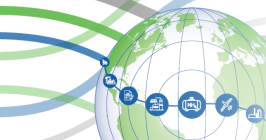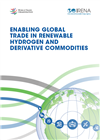

-
-
IRENA and WTO (2024), Enabling global trade in renewable hydrogen and derivative commodities, International Renewable Energy Agency and World Trade Organization, Abu Dhabi and Geneva.
Copied
https://www.irena.org/-/media/Files/IRENA/Agency/Publication/2024/Nov/IRENA_WTO_Enabling_global_trade_renewable_hydrogen_2024.pdf
Copied
Enabling global trade in renewable hydrogen and derivative commodities
Newsletter
This IRENA-WTO joint publication explores the critical role of sound and coherent strategies in promoting renewable hydrogen and the hydrogen-derived commodities – such as renewable ammonia, methanol and e-kerosene – that are essential to decarbonising hard-to-abate sectors including heavy industry and transport.
Renewable hydrogen and its derivatives could account for up to 14% of final energy consumption by 2050, especially in the form of industrial feedstocks and sustainable fuels. As climate and economic factors lead to production cost variations across regions, countries with abundant renewable resources may emerge as exporters, while those with strong industrial sectors but limited renewable resources may rely on imports to decarbonise their processes.
Developing a robust international market for these commodities and fuels demands extensive infrastructure investment, coherent policy frameworks and scaled-up sustainable value chains. This report provides policy makers with practical suggestions for fostering global markets through trade-related tools like standardisation and certification, government support and procurement, carbon pricing, and tariff rebalancing. In turn, the evolution of these markets is expected to support green industrial development and job creation, fostering an efficient energy transition. International collaboration is underscored as essential for aligning market entry requirements, thereby lowering trade barriers and building stable demand for renewable hydrogen and its derivatives. This collaborative approach positions trade policies as a catalyst for an inclusive, global transition to sustainable energy.




